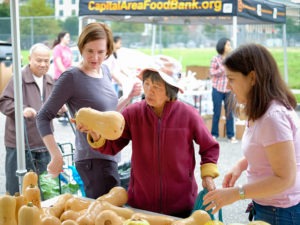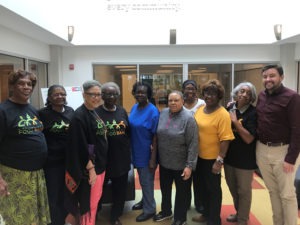As Congress reconvenes this week, the Capital Area Food Bank turns our attention and support to the Reauthorization of the Older Americans Act (OAA). Since 1965, the OAA has provided funding for programs serving 2.5 million Americans over 60 years old, with nearly $900 million annually funding programs in our mission area.
By Michael Waddle, CAFB Consultant, Senior Hunger Innovations.
Hunger doesn’t happen in a vacuum. Despite years of saving and planning, seniors in retirement often find themselves relying on a limited income to meet their many specialized needs. While high-dollar expenses such as rent and healthcare increase, access to necessities such as affordable, healthy food can decrease due to mobility issues, fixed income limitations, and changes in housing amenities.
PJ Douglass is a volunteer and client at Marwood Senior Apartments in Upper Marlboro, MD, where more than 80 seniors participate in the CAFB’s Senior Brown Bag program. She says “most clients at Marwood are former police officers, government employees, firefighters who worked and saved throughout their lives”. But now, she adds, “They need assistance.”
For many, the problem compounds itself. Health incidents become more frequent as we age, and many are forced to make life adjustments to address new limitations. Many of PJ’s peers can no longer live in houses they’ve owned for decades, or in apartments that only have stairs—and they’re not alone. Seniors in their position must often move into senior friendly apartments that have a higher cost of rent. Nationally, we see that 29% of hungry seniors are living with a disability, and 45% of hungry seniors are also renters.
But PJ and her peers at Marwood are just a few of the Capital Area Food Bank’s 10,000 incredible senior clients. Since the 1990s, our Senior Brown Bag program has expanded to serve almost 4,300 seniors throughout the Washington Metro Area and, in recent years, the Commodity Supplemental Food Program has expended to serve almost 5,700 people in Washington, DC and Montgomery County, MD. While we, and our senior program clients, are thankful for the generosity of our area food donors and federal commodities that help make these programs possible, we also understand that seniors require special care and programs that evolve to meet their needs.

Over the past year, the Capital Area Food Bank has been convening an advisory board of metro area seniors, like PJ, to learn more about their needs and how best to serve them. This work has informed our new Strategic Direction (2020-25) wherein we aim to provide food that is age and culturally appropriate. This means providing prepared meals in addition to the shelf-stable items that make up the cornerstone of what we provide, for those that may not have the time or ability to prepare their own meals.
This past summer, PJ and her clients participated in focus groups testing different types of meals—meal kits, frozen foods, and ready-to-eat meals that could be eaten cold or warm. We learned that they preferred frozen meals because it gave them a choice of when to eat the meals. And when it comes to choices, they don’t need too many options or too frequent input. They still valued and wanted their Senior Brown Bag, but also appreciated the autonomy offered by these supplemental meals that would allow them to cook, or have others cook for them, less frequently.
As impactful as these programs—and those funded by the OAA—are, senior hunger persists and is growing. In DC alone, 11% of people over age 60 are food insecure. Just as the CAFB focuses its efforts on research and innovation to better serve senior clients in the Greater Washington area, reauthorization of the OAA is an opportunity to ensure that the best services possible remain available for older Americans in our region and beyond.

